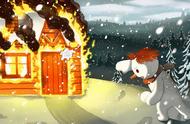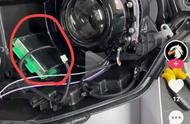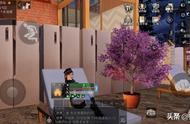* 用英语自身来理解和学习英语是最好的方式,这一系列的文章力求帮助大家在英语阅读能力上有所提升,并树立英语思维;
* 推荐的阅读的方法是:先原文,适当看解析阅读,实在不行再看双语对照。
* 解析中英语单词的音标使用Dictcom和IPA双音标标注,如果需要了解Dictcom音标,请参看我们的《dictionary.com所用的音标体系》一文。
I Hate Summer
【译】我讨厌夏天
【单词】Hate 原型:hate 动词一般现在时(除第三人称单数) [heyt][heɪt] v. 憎恨;厌恶;讨厌 n. 憎恨;厌恶
【单词】Summer 原型:summer 名词 ['suhm-er]['sʌmə] n. 夏天;夏季 adj. 夏季的 v. 度过夏天

Paul Young and Mark Allen were good friends.
【译】保罗·杨和马克·艾伦是好朋友。
【短语】make friends 表示“交朋友”,后常与with搭配,表示“与……交朋友”。如:We need to encourage our children to make friends with people who will pull them up instead of drag them down.
【专有名词】Paul 人名/人物 [pawl][pɔ:l] n. 保罗(男子名)
【专有名词】Young [yuhng][jʌŋ] adj. 年轻的;初期的;没有经验的 n. 青年人
【专有名词】Allen 人名/人物 n. 阿伦,艾伦(男子名,涵义:英俊;好看的)
They both hated summer.
【译】他们都讨厌夏天。
【单词】hated 原型:hate 动词过去式 [heyt][heɪt] v. 憎恨;厌恶;讨厌 n. 憎恨;厌恶
【单词】summer 名词 ['suhm-er]['sʌmə] n. 夏天;夏季 adj. 夏季的 v. 度过夏天
Paul hated that it was always hot.
【译】保罗讨厌天气总是很热。
【单词】hot 形容词 [hot][hɒt] adj. 热的;辣的;强烈的 adv. 激动地;趁热地 v. (使)变热
Mark hated that the park by his house was always crowded.
【译】马克讨厌他家旁边的公园总是很拥挤。
【单词】park 名词 [pahrk][pɑːk] n. 停车场;公园;园区;(球类)运动场 v. 停车;停放;置于
【单词】crowded 原型:crowd 过去分词做形容词 [kroud][kraʊd] n. 人群;群众;大群;朋友 v. 拥挤;挤满;涌入;贴近;逼迫
"I hate summer," Paul told Mark as they played video games in Mark's room.
【译】“我讨厌夏天,”保罗告诉马克,他们在马克的房间里玩电子游戏。
【单词】hate 动词一般现在时(除第三人称单数) [heyt][heɪt] v. 憎恨;厌恶;讨厌 n. 憎恨;厌恶
【单词】games 原型:game 名词复数形式 [geym][ɡeɪm] n. 游戏;运动会;比赛;一场比赛;比赛得分;猎物;花招 v. 赌博 adj. 勇敢的;乐意的;跛的
"I know.
【译】“我知道。
Besides not going to school, there is nothing else that's good about summer," Mark said.
【译】马克说:“除了不上学,夏天没有什么好的事情。
【单词】Besides 原型:besides 介词、从属连词 [bih-'sahydz][bɪ'saɪdz] prep. 除 ... 之外 adv. 此外;也
【单词】else 副词 [els][els] adv. 其他;此外;(常与or连用)否则、不然

As the two friends played their game, Mark's mom started getting upset with the boys.
【译】当这两个朋友玩游戏时,马克的妈妈开始对男孩们感到不安。
【单词】game 名词 [geym][ɡeɪm] n. 游戏;运动会;比赛;一场比赛;比赛得分;猎物;花招 v. 赌博 adj. 勇敢的;乐意的;跛的
【单词】mom 名词 [mom][mɒm] n. 妈妈 abbr. 月中(=middle of month) abbr. 会议纪要(=Minutes of Meeting)
【单词】upset 动词过去分词 [verb, adjective uhp-'set; noun 'uhp-set][ʌp'set] adj. 心烦的;苦恼的;不安的;不适的 v. 推翻;翻倒;颠覆;打乱;使心烦 n. 混乱;推翻
【单词】boys 原型:boy 名词复数形式 [boi][bɔɪ] n. 男孩;儿子;男服务员
"Why don't you boys go outside?"
【译】“你们为什么不出去呢?”
Mark's mom asked.
【译】马克的妈妈问。
【单词】asked 原型:ask 动词过去式 [ask, ahsk][ɑːsk] v. 询问;请求;邀请;要求;开价;期待
Mark replied, "Too many people, and it's too hot."
【译】马克回答说:“人太多了,天气太热了。”
【短语】too many 太多,如果后接名词只能接可数名词(不可数名词用too much);例如:There were too many problems to contend with. 要全力对付的问题真是太多太多了。
【单词】replied 原型:reply 动词过去式 [ri-'plahy][rɪ'plaɪ] v. 回答;答复;回应 n. 回答;答复
Mark's mom had enough; she unplugged the game and told Mark that they had to go outside and do something else.
【译】马克的妈妈受够了;她拔下游戏插头,告诉马克他们必须到外面去做些别的事情。
【用法】have to do sth. 表示“必须”、“不得不”、“只好”、“(被迫)很勉强”去做某事,后面跟动词原形,与情态动词 must 近义但区别在于:have to 表示客观的需要,must 表示说话人主观上的看法,既主观上的必要。例句:My brother was very ill, so I had to call the doctor in the middle of the night. 我弟弟病得很厉害,我只得半夜里把医生请来。(客观上需要做这件事) He said that they must work hard. 他说他们必须努力工作。(主观上要做这件事)
【单词】unplugged 动词过去式 unplugged [uhn-'pluhg][ˌʌn'plʌɡd] adj. 没接电的 adv. 不用电子传音地 动词unplug的过去式和过去分词. unplugged的用法和样例: 词汇搭配 unplug 拔开

They decided to go to the arcade, because at least there they could play games and be inside an air-conditioned building.
【译】他们决定去游戏厅,因为至少在那里,他们可以玩游戏,在一个有空调的屋子里。
【短语】at least 至少;例句:At least, I asked him not to. 至少,我告诉过他不要这样做。
【单词】decided 原型:decide 动词过去式 [dih-'sahyd][dɪ'saɪd] v. 决定;判断;断定
【单词】arcade 名词 [ahr-'keyd][ɑː'keɪd] n. 拱廊;有拱廊的街道;游乐中心,游戏厅
【单词】least 形容词最高级 [leest][liːst] adj. 最小的;最少的 adv. 最小地;最少地;最轻微地 n. 最小;最少
【单词】inside 介词、从属连词 [preposition in-'sahyd, 'in-sahyd; adverb in-'sahyd; noun 'in-'sahyd; adjective in-'sahyd, 'in-, 'in-sahyd][ˌɪn'saɪd] adj. 里面的 adv. 在里面 n. 内部 prep. 在 ... 里面
【单词】air-conditioned 形容词 adj. 备有空调装置的;装有冷暖气机的
【单词】building 原型:build 动名词 [bild][bɪld] v. 建造;开发;创建;逐渐增强 n. 体格;身材
When they got there, they realized that two of their friends were at the arcade, too.
【译】当他们到达那里时,他们意识到他们的两个朋友也在。
【单词】realized 原型:realize 动词过去式 ['ree-uh-lahyz]['riːəlaɪz] vt. 实现;了解;意识到;变卖
It was Susan and Carol.
【译】是苏珊和卡罗尔。
【专有名词】Susan ['soo-zuh n]['suːzn] n. 苏珊(女子名)
【专有名词】Carol ['kar-uh l]['kærəl] n. 颂歌;欢乐的歌;卡罗尔(人名)
Paul liked Susan; Mark didn't really like Carol that much, but he agreed to stay with Carol, so that Paul could hang out with Susan alone.
【译】保罗喜欢苏珊;马克并不那么喜欢卡罗尔,但他同意和卡罗尔在一起,这样保罗就可以单独和苏珊在一起了。
【单词】agreed 原型:agree 动词过去式 [uh-'gree][ə'ɡriː] v. 同意;赞成;承认;符合;一致
【单词】stay 动词原形 [stey][steɪ] v. 停留;逗留;保持 n. 停留;逗留
【单词】hang 动词原形 [hang][hæŋ] v. 悬挂;(使)低垂;悬浮(在空中);逗留;绞死 n. 悬挂方式;悬挂;绞刑
【单词】alone 副词 [uh-'lohn][ə'ləʊn] adj. 单独的;独自一人的;孤单的 adv. 独自地;仅仅
"Don't do anything stupid, Mark," Paul said.
【译】“马克,别做傻事,”保罗说。
【单词】stupid 形容词 ['stoo-pid, 'styoo‐]['stjuːpɪd] adj. 愚蠢的;笨拙的;无聊的;乏味的 n. 傻瓜
"Oh, shut up and go talk to Susan," Mark said.
【译】“哦,闭嘴,去和苏珊谈谈,”马克说。
【单词】Oh 原型:oh 语气词 [oh][əʊ] int. 啊呀;哦
【单词】shut 动词过去分词 [shuht][ʃʌt] v. 关闭;合拢;停止 adj. 关闭的;停止营业的 n. 关闭
【单词】talk 名词 [tawk][tɔːk] v. 交谈;商讨;演讲;阐述;劝服 n. 谈话;会谈;讨论;讲话;空谈
Paul went up to Susan and asked her if she wanted to play a shooting game with him.
【译】保罗走到苏珊跟前,问她要不要和他玩射击游戏。
【固定用法】up to ... 是多意短语,可能的意思主要有:“一直到”,“多达.../最多到”,“忙于…”,“正在做…”,“由…决定”等;当然如果前面是get等与up固定搭配的词,up是它的基本意思(向上的);例句:She can count up to one hundred and backward. 她能数到一百然后再倒着数回来。Our history textbooks only go up to the World War Ⅱ. 我们的历史教科书仅写到第二次世界大战。The figures add up to 450. 这些数字加起来的总数是450。
【单词】shooting 原型:shoot 动词现在进行式或动名词 [shoot][ʃuːt] v. 发射;开枪;疾驰;拍照 n. 发射;嫩枝 int. 哇! 可恶! 哎呀!
She said yes.
【译】她答应了。
After they played the game, they went back to meet with Carol and Mark.
【译】他们玩完游戏后,回去见了卡罗尔和马克。
【单词】meet 动词原形 [meet][miːt] v. 遇见;满足 n. 运动会;集会 adj. 合适的

"You know, Carol and I were about to leave.
【译】“你知道,卡罗尔和我正要离开。
【单词】leave 动词原形 [leev][liːv] v. 委托;离开;留给;遗留;遗赠;听任 n. 许可;准假;告别 vi. 生出叶子
You guys want to come with us?"
【译】你们想和我们一起去吗?”
【单词】guys 原型:guy 名词复数形式 [gahy][ɡaɪ] n. 家伙;(男)人 n. 拉索;牵索 vt. 嘲笑
Susan asked the boys.
【译】苏珊问男孩们。
"Sure, where to?"
【译】“当然,去哪儿?”
Paul asked.
【译】保罗问。
Susan said that they were going to the park, because she liked to see all the people having fun there.
【译】苏珊说他们要去公园,因为她喜欢看到所有人在那里玩得开心。
【单词】fun 名词 [fuhn][fʌn] n. 乐趣;玩笑 adj. 有趣的
"Awesome, I love going to the park during the summer," Paul said.
【译】“太棒了,我喜欢夏天去公园,”保罗说。
【单词】Awesome 原型:awesome 形容词 ['aw-suh m]['ɔːsəm] adj. 可怕的;表示敬畏的;了不起的;精彩的,绝妙的
He looked at Mark and whispered, "Shut up, don't say anything."
【译】他看着马克小声说:“闭嘴,什么也别说。”
【单词】whispered 原型:whisper 过去分词做形容词 ['hwis-per, 'wis-per]['wɪspə] n. 低语;窃窃私语;飒飒的声音 vi. 低声说;窃窃私语;飒飒地响 vt. 耳语;私语
【单词】Shut 原型:shut 动词原形 [shuht][ʃʌt] v. 关闭;合拢;停止 adj. 关闭的;停止营业的 n. 关闭
They all left, and Mark looked like he was going to cry.
【译】他们都走了,马克看起来要哭了。
【单词】cry 名词 [krahy][kraɪ] v. 哭;(大声)叫喊;(强烈)要求 n. 叫声;哭;喊
"I hate summer," Mark said to himself.
【译】“我讨厌夏天,”马克自言自语地说。














